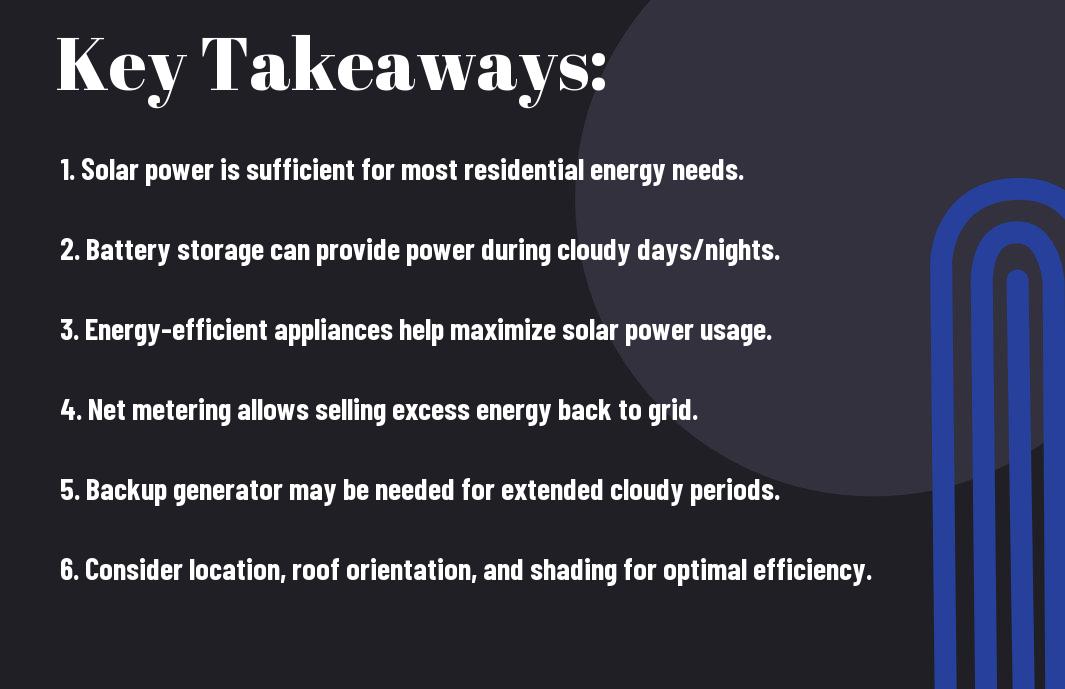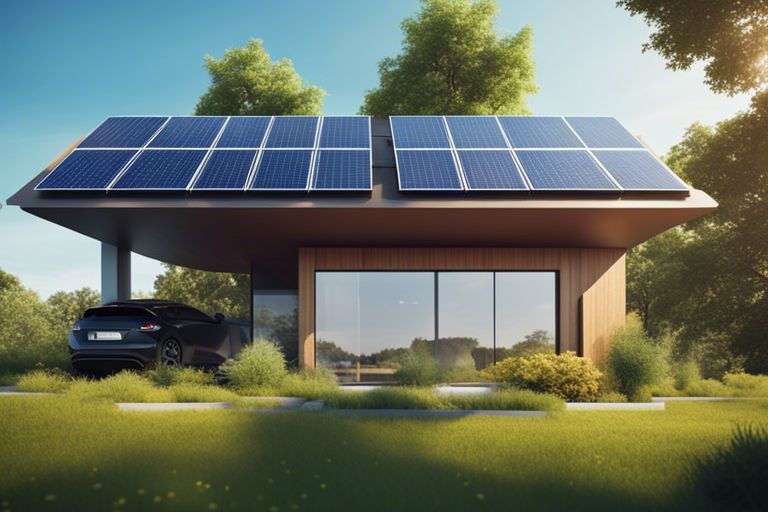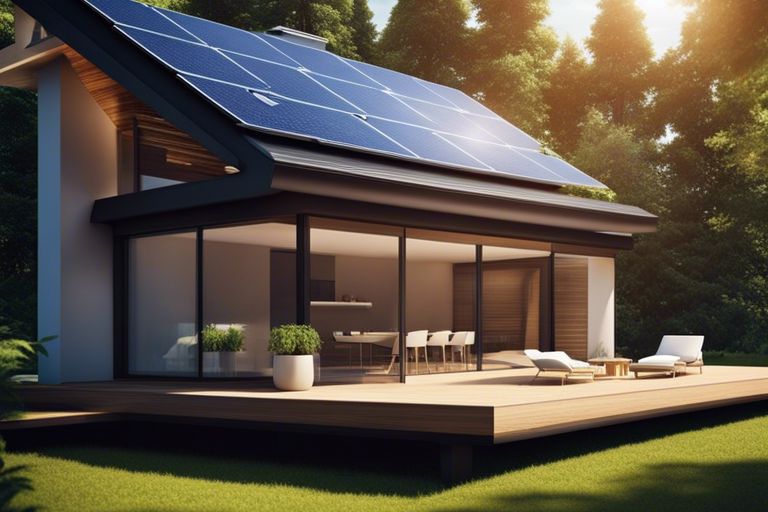Homeowners often wonder if their home can solely rely on solar power. In this informative post, you will explore the possibilities and challenges of running a home entirely on solar energy. From understanding solar panels’ efficiency to calculating your energy needs, you will uncover the practicalities of going off the grid and reducing your carbon footprint. Let’s probe into the world of solar power and see if it can truly power your home.
Key Takeaways:
- Energy Efficiency: It is necessary to incorporate energy-efficient appliances and practices to maximize the use of solar power in a home.
- Battery Storage: Utilizing battery storage systems can help store excess solar energy for use during periods of low sunlight or at night.
- Seasonal Considerations: Understanding seasonal variations in sunlight and energy production is crucial when relying solely on solar power for a home.


The Basics of Solar Power
How Solar Panels Work
On a basic level, solar panels work by converting sunlight into electricity through a process called the photovoltaic effect. When sunlight hits the solar panels, the silicon cells within the panels generate an electrical current. This direct current (DC) is then converted into usable alternating current (AC) by an inverter, which can power your home’s electrical appliances and lighting.
Benefits of Solar Energy
Powering your home with solar energy has numerous benefits. Not only can you reduce your carbon footprint and contribute to a cleaner environment, but you can also save money on your utility bills in the long run. By generating your own electricity from the sun, you can reduce or even eliminate your reliance on the traditional grid, giving you more control over your energy consumption and costs.
With solar energy, you can also take advantage of various financial incentives and rebates offered by governments and utility companies to make the switch to renewable energy more affordable. Additionally, installing solar panels can increase the value of your home and appeal to environmentally-conscious buyers if you decide to sell in the future.
Can a Home Run on Solar Power Alone?
If you’ve ever considered transitioning your home to run solely on solar power, you may have wondered if it’s actually feasible. Let’s explore the theoretical possibilities and real-world examples to see if running a home on solar power alone is a viable option for you.
Theoretical Possibilities
Any home has the potential to run on solar power alone in theory. With advancements in solar technology and energy storage systems, it’s possible to generate enough electricity to cover your home’s energy needs. By installing solar panels on your roof and using batteries to store excess energy for use during periods of low sunlight, you can achieve energy independence and reduce your reliance on the grid.
Real-World Examples
One real-world example of a home running on solar power alone is the Zero House in Colorado. This innovative home is entirely off-grid, relying solely on solar panels and battery storage to power its operations. The Zero House demonstrates that with careful planning and the right technology, it is indeed possible to live comfortably without being connected to the traditional utility grid.
Plus, with government incentives and tax credits available for installing solar panels, the upfront cost of transitioning to solar power can be significantly reduced. This makes it an even more attractive option for homeowners looking to reduce their carbon footprint and save on their energy bills in the long run.
Energy Requirements of a Home
Average Energy Consumption
Energy consumption in a typical home can vary depending on several factors such as the size of the house, the number of occupants, and the appliances used. On average, a typical American household consumes about 877 kWh per month. This includes energy used for lighting, heating, cooling, electronics, and other vital appliances.
Peak Energy Demands
For many homes, peak energy demands occur during the early morning when everyone is getting ready for the day, and in the evening when cooking, cleaning, and entertainment activities are in full swing. These peak times can put a strain on the electrical grid and may require additional energy sources to meet the demand.
Meeting peak energy demands can be challenging when relying solely on solar power, as solar energy production is dependent on the availability of sunlight. This is where energy storage solutions like batteries can play a crucial role in ensuring a continuous and reliable power supply for your home.

Solar Power Generation Capacity
Factors Affecting Energy Output
Your solar power generation capacity is influenced by several factors. The efficiency of your solar panels, the amount of sunlight your location receives, the angle and orientation of your panels, and any shading from trees or buildings can all impact the energy output of your system.
- Efficiency of your solar panels: Higher efficiency panels can generate more electricity from the same amount of sunlight.
- Amount of sunlight: More sunlight means more energy production.
- Angle and orientation of panels: The angle at which your panels are installed and their orientation towards the sun can affect how much sunlight they receive.
Assume that you have high-efficiency panels, optimal sunlight exposure, and proper panel placement for maximum energy output.
Typical Solar Panel Systems
For a typical solar panel system, the average residential installation ranges from 5 to 15 kilowatts, depending on your energy needs and available roof space. A 5-kilowatt system can generate around 7,000-10,000 kilowatt-hours per year, covering a significant portion of your household electricity consumption.
Another common practice is to combine solar panels with battery storage systems to store excess energy generated during the day for use at night, ensuring a more consistent and reliable power supply.
Energy Storage and Backup Systems
Many advancements in battery technology have made it possible for homes to store excess energy generated by solar panels for later use. This means that even when the sun isn’t shining, you can still power your home with clean energy. Lithium-ion batteries, like those used in electric vehicles, are now being employed in home energy storage systems. These batteries are efficient, long-lasting, and require minimal maintenance, making them an ideal choice for storing solar energy.
Battery Technology Advancements
Any homeowner looking to go solar should consider investing in the latest battery technology to maximize the benefits of their solar power system. With advancements in battery storage, you can store more energy than ever before, allowing you to power your home even during cloudy days or at night. These batteries are also becoming more affordable, making them a practical choice for homeowners looking to reduce their reliance on the grid.
Grid-Tie Systems vs. Off-Grid Systems
Systems that are connected to the grid, known as grid-tie systems, allow you to sell excess energy back to the grid when your solar panels produce more electricity than your home needs. On the other hand, off-grid systems operate independently of the grid, relying solely on the energy stored in batteries.
For instance, if you live in a remote location where connecting to the grid is not feasible, an off-grid system would be the best option for you. However, if you want to take advantage of net metering and potentially lower your electricity bills, a grid-tie system may be more suitable.
Challenges and Limitations
Intermittent Energy Source
Now, one of the challenges of relying solely on solar power for your home is that it is an intermittent energy source. This means that its availability is dependent on sunlight, which is not constant throughout the day or during different seasons. As a result, there may be times when your solar panels are not producing enough electricity to power your home’s needs.
To mitigate this issue, you can invest in battery storage systems to store excess energy generated during sunny periods for use when sunlight is scarce. However, these systems can add to the overall cost of your solar power setup.
High Upfront Costs
Source: Now, another limitation when considering powering your home with solar energy is the high upfront costs associated with installing solar panels and related equipment. While solar power can lead to long-term savings on your energy bills, the initial investment required can be significant.
Another option to manage the high upfront costs is to look for financing and incentive programs offered by governments or energy companies to help offset some of the expenses associated with installing solar panels. Be sure to explore all available options to make solar power a more affordable choice for your home.
Conclusion
Hence, while it may be theoretically possible for a home to run on solar power alone, it is crucial to consider various factors such as energy consumption, available sunlight, system efficiency, and backup energy sources. To achieve energy independence through solar power, you would need to carefully assess your home’s energy needs, install a sufficient number of solar panels, and incorporate energy storage solutions like batteries. In addition, having backup generators or connections to the grid can provide peace of mind during times of low sunlight or system malfunctions.
Ultimately, transitioning to solar power can be a sustainable and cost-effective solution for powering your home. By carefully planning and optimizing your solar energy system, you can reduce your carbon footprint, lower your electricity bills, and potentially achieve energy self-sufficiency. Embracing solar power not only benefits the environment but also offers a sense of empowerment in taking control of your energy consumption and reducing reliance on traditional energy sources.
FAQ
Q: Can a home run on solar power alone?
A: Yes, a home can run on solar power alone by installing a sufficient number of solar panels to generate enough electricity to meet the home’s needs. This typically involves installing a solar power system that includes solar panels, inverters, and batteries for energy storage.
Q: What are the benefits of running a home on solar power alone?
A: Running a home on solar power alone has several benefits, including lower electricity bills, reduced dependence on the grid, and environmental sustainability. Solar power is a renewable energy source that produces clean electricity and can help reduce the carbon footprint of a home.
Q: Is it possible to go completely off-grid with solar power?
A: Yes, it is possible to go completely off-grid with solar power by installing a solar power system that is designed to meet all of the home’s electricity needs. This typically involves a larger solar panel array, more advanced inverters, and energy storage solutions like batteries to store excess energy for use when the sun is not shining.
